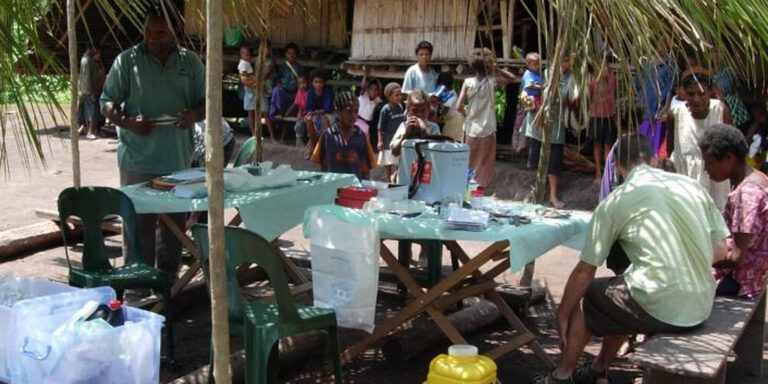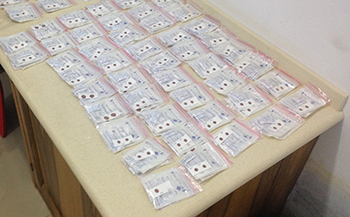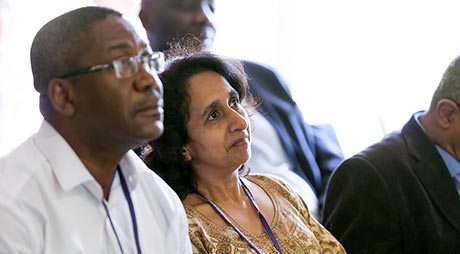Introduction
The P. vivax Genome Variation project aims to understand genome diversity of this parasite that, because it can remain dormant in the liver for years, is particularly hard to eliminate using conventional malaria control measures.
Objectives & Coordination
Plasmodium vivax is a major cause of illness in many tropical regions, particularly South America and much of Asia. The biology of P. vivax parasites complicates efforts to study its genome: the parasites don’t grow well in culture, hampering in vitro studies, and infections are characterised by a lower density of parasites in the blood, making it difficult to isolate sufficient parasite DNA for sequencing.
The P. vivax Genome Variation project is coordinated by the MalariaGEN Resource Centre and connects multiple research groups which are primarily concerned with understanding the population genetics and identifying the genetic causes of antimalarial drug resistance in P. vivax — a major public health concern.
Our work is focused on three related objectives:
Building a catalogue of P. vivax genome variation
We aim to create a genome-wide catalogue of P. vivax polymorphisms generated by sequencing clinical samples from endemic countries, which we will then use to construct a high-resolution map of genome variation and population genetics. This resource will provide a foundation for genomic surveillance of P. vivax to guide malaria elimination.
Providing researchers with standardised genotype data on their samples
Our sequence data analysis pipeline provides researchers with high-quality genotype calls on their samples in a standardised format which enables reliable comparisons to be made with data from other studies and geographical locations.
Publishing global analyses of genome variation, population genetics and evolutionary selection
The data resources generated through this project will be valuable in addressing a range of scientific questions in addition to drug resistance. Although P. vivax causes much less mortality than P. falciparum, there is growing recognition that it can sometimes cause severe complications, raising the question of whether there are parasite genetic factors that cause some strains of P. vivax to be more virulent than others. There is also much interest in whether there are genetic types of parasite that can overcome the resistance to P. vivax infection possessed by African populations due to the Duffy negative blood group.
Sampling locations
Afghanistan, Bhutan, Brazil, Cambodia, China, India, Indonesia, Iran, Laos, Madagascar, Malaysia, Myanmar, Papua New Guinea, Sri Lanka, Thailand, Vietnam.
Data
The following data have been released by the P. vivax Genome Variation project:
Current
Sample information for 1,895 samples from 27 countries
ENA Accessions, Genotype data, Sample metadata, SNPsOpen access
Sample information and genotypes for 228 samples from 13 countries
Open access
For partners
Resources for partners working on parasites
Partner studies
We work with investigators who are pursuing independent partner studies in a number of malaria-endemic countries. Click a link below to learn more about their work.
Partner study description Samples were collected in the southern province of Binh Phuoc, Vietnam, as part of a set of clinical studies initiated by Professor Tran Tinh Hien and Christiane Dolecek in 2009…
Partner study description In field-based studies, Rick Fairhurst and colleagues investigated patient responses to artemisinin combination therapies (ACTs), in three Cambodian provinces, where artemisinin resistance is entrenched (Pursat), emerging (Preah Vihear), or uncommon…
Partner study description Marcelo Ferreira and colleagues contributed to the early stages of the MalariaGEN Plasmodium vivax Genome Variation project by providing samples that were not themselves the basis of a partner study,…
Partner study description Nadira Karunaweera and colleagues contributed to the early stages of the MalariaGEN Plasmodium vivax Genome Variation project by providing samples that were not themselves the basis of a partner study,…
Partner study description The Oxford University Clinical Research Unit in Vietnam contributed to the early stages of the MalariaGEN Plasmodium vivax Genome Variation project by providing samples that were not themselves the basis…
Partner study description Ivo Mueller and colleagues contributed to the early stages of the MalariaGEN Plasmodium vivax Genome Variation project by providing samples that were not themselves the basis of a partner study,…
Partner study description TRAC is investigating the scope and spread of parasite resistance to artemisinin-based therapies at sites across Asia and Africa. The first TRAC study has been completed. This multi-centre, open-label randomised…
Partner study description Microsatellite analysis has previously demonstrated that Plasmodium falciparum populations on the north coast of PNG are organised into distinct subpopulations. If this pattern is observed throughout PNG, maps of population…
Partner study description Since 2004, Ethiopia has adopted a species-specific treatment policy for malaria: artemether-lumefantrine (AL) for the treatment of uncomplicated Plasmodium falciparum malaria and chloroquine (CQ) for Plasmodium vivax infections. P. falciparum…
Partner study description The island of Madagascar is geographically situated in the south western region of the Indian Ocean and amongst malaria-endemic countries, its situation is unique: historically, human migration has occurred from…
Partner study description As a service to the P. vivax genomics scientific community, GSK made DNA from the DETECTIVE and GATHER trials available for whole genome sequencing and analysis. The whole genome sequence…
Partner study description Ric Price, Rintis Noviyanti and Francois Nosten are the principal investigators in a genome-wide study that aims to characterise the molecular profile of drug resistance-conferring variants in Thai and Indonesian…
Partner study description This project describes the genomic component within the broader vivaxGEN initiative. The vivaxGEN network comprises researchers and other key stakeholders from across the globe with a shared aim to develop…
Partner study description The Plasmodium vivax samples due to be collected from Ethiopia and Madagascar will contribute to the Pan-African Malaria Genetic Epidemiology Network (PAMGEN) project. The aim of PAMGEN is to create…
Publications
- An open dataset of Plasmodium vivax genome variation in 1,895 worldwide samples
MalariaGEN et. alWellcome Open Research, 2022; 7 136- Using deep learning to identify recent positive selection in malaria parasite sequence data
Deelder et al.Malaria Journal, 2021; 20(1) 270- Distinctive genetic structure and selection patterns in Plasmodium vivax from South Asia and East Africa
Benavente et al.Nature Communications, 2021; 12(1) 3160- Population genomic evidence of Plasmodium vivax Southeast Asian origin
Daron et al.Science Advances, 2021; 7(18) eabc3713- Genomic analysis reveals independent evolution of Plasmodium falciparum populations in Ethiopia
Abera D et alMalaria Journal, 2021; 20 129- Whole genome sequencing of Plasmodium vivax isolates reveals frequent sequence and structural polymorphisms in erythrocyte binding genes
Ford et al.PLoS Neglected Tropical Diseases, 2020; 14(10) e0008234- Genetic diversity and neutral selection in Plasmodium vivax erythrocyte binding protein correlates with patient antigenicity
Han et al.PLoS Neglected Tropical Diseases, 2020; 14(7) e0008202- Plasmodium vivax Malaria Viewed through the Lens of an Eradicated European Strain
van Dorp et al.Molecular Biology and Evolution, 2020; 37(3) 773-785- A molecular barcode to inform the geographical origin and transmission dynamics of Plasmodium vivax malaria
Diez Benavente et al.PLoS Genetics, 2020; 16(2) e1008576- A molecular barcode and online tool to identify and map imported infection with Plasmodium vivax
Trimarsanto et al.bioRxiv, 2019; 776781- Genomic analysis of Plasmodium vivax in southern Ethiopia reveals selective pressures in multiple parasite mechanisms.
Auburn et al.The Journal of Infectious Diseases, 2019; 220 1738-1749- Tafenoquine versus Primaquine to Prevent Relapse of Plasmodium vivax Malaria
Llanos-Cuentas et al.New England Journal of Medicine , 2019; 380(3) 229-241- Single-Dose Tafenoquine to Prevent Relapse of Plasmodium vivax Malaria
Lacerda et al.New England Journal of Medicine, 2019; 380(3) 215-228- Genomic analysis of a pre-elimination Malaysian Plasmodium vivax population reveals selective pressures and changing transmission dynamics
Auburn S, Benavente ED, et al.Nature Communications, 2018; 9 2585- Genomic variation in Plasmodium vivax malaria reveals regions under selective pressure
Diez Benavente et al.PLoS One, 2017; 12(5) e0177134- A new Plasmodium vivax reference sequence with improved assembly of the subtelomeres reveals an abundance of pir genes
Auburn et al.Wellcome Open Research, 2016; 1 4- Genomic analysis reveals a common breakpoint in amplifications of the Plasmodium vivax multidrug resistance 1 locus in Thailand
Auburn et al.The Journal of Infectious Diseases, 2016; 214 1235-1242- Independent origin and global distribution of distinct Plasmodium vivax Duffy Binding Protein gene duplications
Hostetler et al.PLoS Neglected Tropical Diseases, 2016; 10(10) e0005091- Genomic analysis of local variation and recent evolution in Plasmodium vivax
Pearson et alNature Genetics, 2016; 48 959-964- Effective preparation of Plasmodium vivax field isolates for high-throughput whole genome sequencing
Auburn et al.PLoS One, 2013; 8(1) e53160
1,895 samples
from
27 countries
Project contact
People
Investigators involved in the P. vivax Genome Variation project include:
- Dr Alyssa Barry
- Prof Arjen Dondorp
- Chanaki Amaratunga
- Dr Christiane Dolecek
- Professor Elizabeth Ashley
- Prof Francois Nosten
- Dr G L Abby Harrison
- Prof Ivo Mueller
- Dr Jutta Marfurt
- Livingstone Tavul
- Prof Maciej Boni
- Dr Marcelo Ferreira
- Professor Milijaona Randrianarivelojosia
- Prof Nadira Karunaweera
- Prof Nicholas J White
- Assoc Prof Pascal Michon
- Dr Pharath Lim
- Prof Ric N Price
- Dr Rick Fairhurst
- Dr Rintis Noviyanti
- Dr Sarah Auburn
- Dr Thuy‐Nhien Nguyen
- Prof Tran Tinh Hien
Updates
19 Apr 2022
Data release (v4.0)
We’ve released the P. vivax Genome Variation project data (v4.0). This major release includes 4.5M SNPs based on an analysis of 1,895 samples from 14 studies. Details of the release can be found in the key publication MalariaGEN et al, Wellcome Open Research 2022, 7:136 https://doi.org/10.12688/wellcomeopenres.17795.1.
16 Dec 2016
Partner data release (v3.0)
We’ve released the P. vivax Genome Variation project data (v3.0) to partners. This major release includes 1.2M SNPs and 0.3M indels based on an analysis of 733 samples from 15 partner studies. Partners with data in this release should receive an email and can login to access data on their samples.
21 Mar 2016
Partner data release (v2.0)
We’ve released the P. vivax Genome Variation project data (v2.0) to partners. This major release includes 514,477 high-quality SNPs based on an analysis of 641 samples from 14 partner studies. Partners with data in this release should receive an email and can login to access data on their samples.
26 Nov 2015
Partner data release (v1.0)
We’ve released the P. vivax Genome Variation project data (v1.0) to partners. This major release includes includes 303,616 high-quality SNPs based on an analysis of 228 samples from 12 partner studies. Partners with data in this release should receive an email and can login to access data on their samples.
8 May 2013
Initial data release to partners (v0.1)
We’ve released initial genotype data (v0.1) to partners. Partners with data in this release will have received an email, and can login to access data on their samples.



